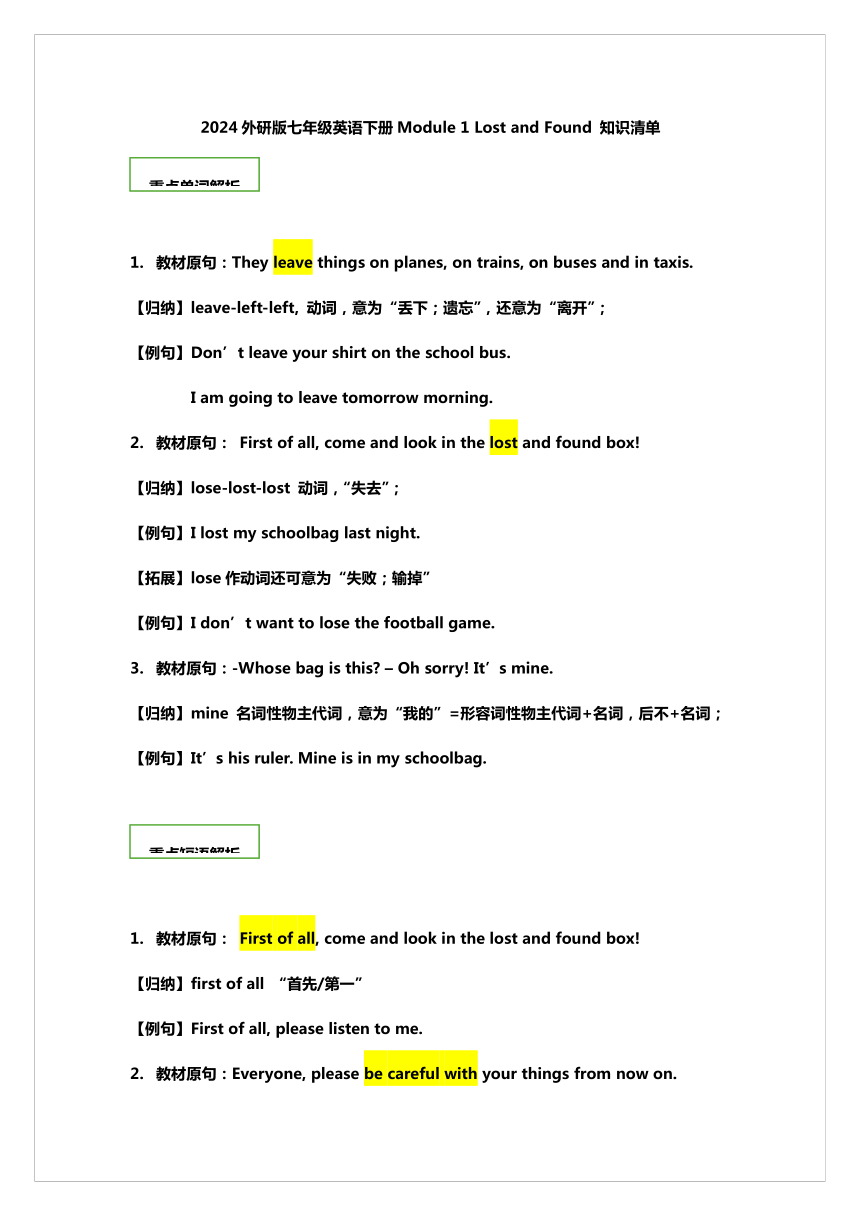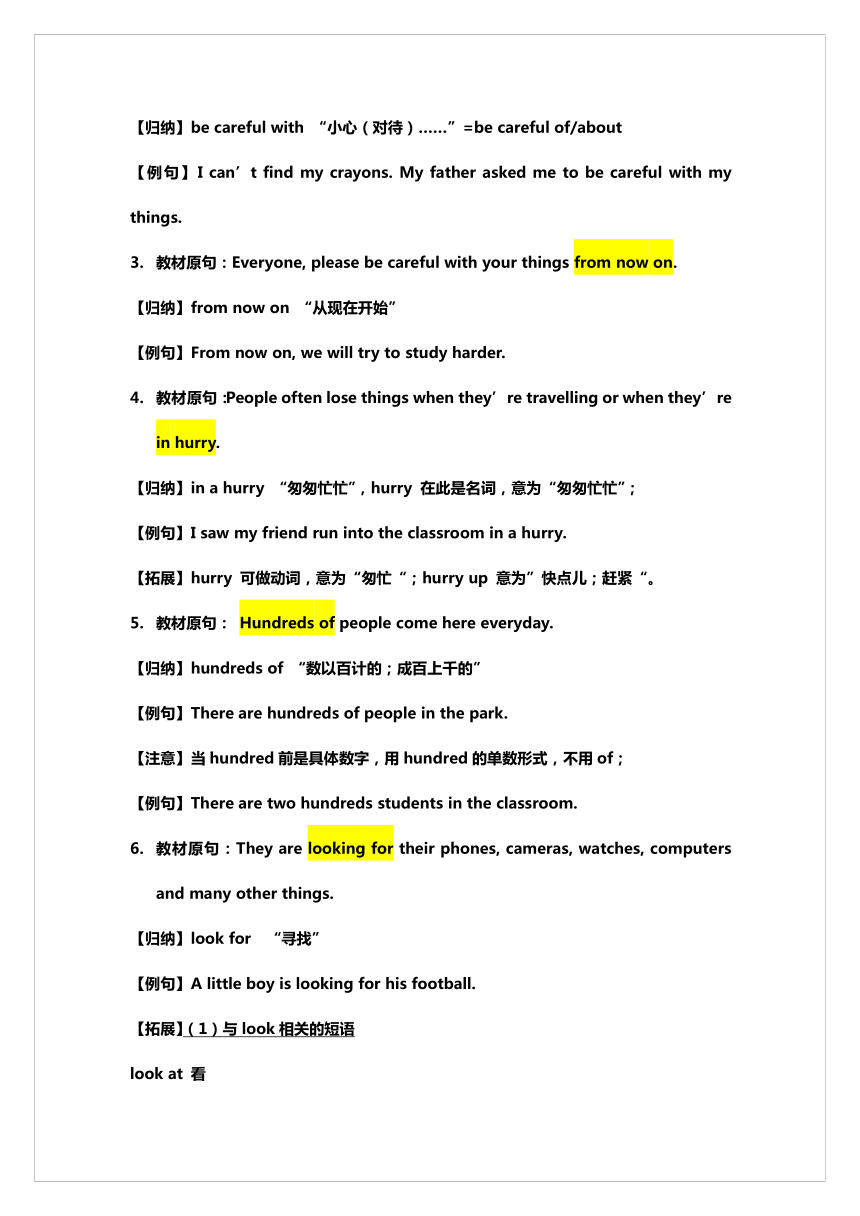Module 1 Lost and Found 知识清单 外研版七年级英语下册
文档属性
| 名称 | Module 1 Lost and Found 知识清单 外研版七年级英语下册 |

|
|
| 格式 | docx | ||
| 文件大小 | 29.5KB | ||
| 资源类型 | 教案 | ||
| 版本资源 | 外研版 | ||
| 科目 | 英语 | ||
| 更新时间 | 2024-02-21 19:53:19 | ||
图片预览


文档简介
2024外研版七年级英语下册Module 1 Lost and Found 知识清单
教材原句:They leave things on planes, on trains, on buses and in taxis.
【归纳】leave-left-left, 动词,意为“丢下;遗忘”,还意为“离开”;
【例句】Don’t leave your shirt on the school bus.
I am going to leave tomorrow morning.
教材原句: First of all, come and look in the lost and found box!
【归纳】lose-lost-lost 动词,“失去”;
【例句】I lost my schoolbag last night.
【拓展】lose作动词还可意为“失败;输掉”
【例句】I don’t want to lose the football game.
教材原句:-Whose bag is this – Oh sorry! It’s mine.
【归纳】mine 名词性物主代词,意为“我的”=形容词性物主代词+名词,后不+名词;
【例句】It’s his ruler. Mine is in my schoolbag.
教材原句: First of all, come and look in the lost and found box!
【归纳】first of all “首先/第一”
【例句】First of all, please listen to me.
教材原句:Everyone, please be careful with your things from now on.
【归纳】be careful with “小心(对待)……”=be careful of/about
【例句】I can’t find my crayons. My father asked me to be careful with my things.
教材原句:Everyone, please be careful with your things from now on.
【归纳】from now on “从现在开始”
【例句】From now on, we will try to study harder.
教材原句:People often lose things when they’re travelling or when they’re in hurry.
【归纳】in a hurry “匆匆忙忙”,hurry 在此是名词,意为“匆匆忙忙”;
【例句】I saw my friend run into the classroom in a hurry.
【拓展】hurry 可做动词,意为“匆忙“;hurry up 意为”快点儿;赶紧“。
教材原句: Hundreds of people come here everyday.
【归纳】hundreds of “数以百计的;成百上千的”
【例句】There are hundreds of people in the park.
【注意】当hundred前是具体数字,用hundred的单数形式,不用of;
【例句】There are two hundreds students in the classroom.
教材原句:They are looking for their phones, cameras, watches, computers and many other things.
【归纳】look for “寻找”
【例句】A little boy is looking for his football.
【拓展】(1)与look相关的短语
look at 看
look like 长得像
look after 照顾
look down 向下看
look up 查阅;向上看
look through 浏览
look out 小心
look forward to 期待
look around 环顾四周
(2)辨析look for和find:look for 意为“寻找”,强调过程;find 意为“找到”,强调结果;
【例句】She is looking for her schoolbag. But she can’t find it.
教材原句:-Whose bag is this – Oh sorry! It’s mine.
【归纳】Whose “谁的“
【句型结构】问句:Whose+物品+is this 答语:It’s+名词性物主代词/名词所有格.
【例句】-Whose cap is this – It’s Tom’s.
教材原句:Here’s a purple wallet!
【归纳】Here+be 的倒装句,后+名词。
【例句】Here are some beautiful flowers!
【注意】若主语是代词,用“Here+主语+be”。
【例句】-Where is my schoolbag – Here it is!
教材原句:I think it’s Betty’s.
【归纳】I think +宾语从句
【例句】I think it is a good idea.
【注意】若主句是I/We think/believe时,宾语从句表示否定意义,要否定主句,这是宾语从句中的“否定前移”。
【例句】I don’t think that’s a good idea.
教材原句:People often lose things when they’re travelling or when they’re in hurry.
【归纳】when 引导的时间状语从句,when是连词,意为“当……的时候”;
【例句】When you smile at others, they will smile back.
教材原句:That’s why there are lost and found offices at airports and stations.
【归纳】That’s why… “那就是……的原因”,why引导表语从句;
【例句】That’s why she doesn’t like cats.
教材原句:They can help you find them!
【归纳】help sb. do sth. “帮助某人做某事“=help sb. to do sth.=help sb. with sth.
【例句】I will help my mother do the housework.=I will help my mother with the housework.
物主代词
构成
形容词性物主代词 第一人称 my 我的 our 我们的
第二人称 your 你的;你们的
第三人称 his 他的 her 她的 its 它的 their 他们/她们/它们的
名词性 物主代词 第一人称 mine 我的 ours 我们的
第二人称 yours 你的;你们的
第三人称 his 他的 hers 她的 its 它的 theirs他们/她们/它们的
用法
形容词性物主代词起adj.作用,放名词前;
e.g. This is my English teacher.
(2)名词性物主代词起名词作用=形容词性物主代词+名词
e.g. It’s not my book. It’s hers.
教材原句:They leave things on planes, on trains, on buses and in taxis.
【归纳】leave-left-left, 动词,意为“丢下;遗忘”,还意为“离开”;
【例句】Don’t leave your shirt on the school bus.
I am going to leave tomorrow morning.
教材原句: First of all, come and look in the lost and found box!
【归纳】lose-lost-lost 动词,“失去”;
【例句】I lost my schoolbag last night.
【拓展】lose作动词还可意为“失败;输掉”
【例句】I don’t want to lose the football game.
教材原句:-Whose bag is this – Oh sorry! It’s mine.
【归纳】mine 名词性物主代词,意为“我的”=形容词性物主代词+名词,后不+名词;
【例句】It’s his ruler. Mine is in my schoolbag.
教材原句: First of all, come and look in the lost and found box!
【归纳】first of all “首先/第一”
【例句】First of all, please listen to me.
教材原句:Everyone, please be careful with your things from now on.
【归纳】be careful with “小心(对待)……”=be careful of/about
【例句】I can’t find my crayons. My father asked me to be careful with my things.
教材原句:Everyone, please be careful with your things from now on.
【归纳】from now on “从现在开始”
【例句】From now on, we will try to study harder.
教材原句:People often lose things when they’re travelling or when they’re in hurry.
【归纳】in a hurry “匆匆忙忙”,hurry 在此是名词,意为“匆匆忙忙”;
【例句】I saw my friend run into the classroom in a hurry.
【拓展】hurry 可做动词,意为“匆忙“;hurry up 意为”快点儿;赶紧“。
教材原句: Hundreds of people come here everyday.
【归纳】hundreds of “数以百计的;成百上千的”
【例句】There are hundreds of people in the park.
【注意】当hundred前是具体数字,用hundred的单数形式,不用of;
【例句】There are two hundreds students in the classroom.
教材原句:They are looking for their phones, cameras, watches, computers and many other things.
【归纳】look for “寻找”
【例句】A little boy is looking for his football.
【拓展】(1)与look相关的短语
look at 看
look like 长得像
look after 照顾
look down 向下看
look up 查阅;向上看
look through 浏览
look out 小心
look forward to 期待
look around 环顾四周
(2)辨析look for和find:look for 意为“寻找”,强调过程;find 意为“找到”,强调结果;
【例句】She is looking for her schoolbag. But she can’t find it.
教材原句:-Whose bag is this – Oh sorry! It’s mine.
【归纳】Whose “谁的“
【句型结构】问句:Whose+物品+is this 答语:It’s+名词性物主代词/名词所有格.
【例句】-Whose cap is this – It’s Tom’s.
教材原句:Here’s a purple wallet!
【归纳】Here+be 的倒装句,后+名词。
【例句】Here are some beautiful flowers!
【注意】若主语是代词,用“Here+主语+be”。
【例句】-Where is my schoolbag – Here it is!
教材原句:I think it’s Betty’s.
【归纳】I think +宾语从句
【例句】I think it is a good idea.
【注意】若主句是I/We think/believe时,宾语从句表示否定意义,要否定主句,这是宾语从句中的“否定前移”。
【例句】I don’t think that’s a good idea.
教材原句:People often lose things when they’re travelling or when they’re in hurry.
【归纳】when 引导的时间状语从句,when是连词,意为“当……的时候”;
【例句】When you smile at others, they will smile back.
教材原句:That’s why there are lost and found offices at airports and stations.
【归纳】That’s why… “那就是……的原因”,why引导表语从句;
【例句】That’s why she doesn’t like cats.
教材原句:They can help you find them!
【归纳】help sb. do sth. “帮助某人做某事“=help sb. to do sth.=help sb. with sth.
【例句】I will help my mother do the housework.=I will help my mother with the housework.
物主代词
构成
形容词性物主代词 第一人称 my 我的 our 我们的
第二人称 your 你的;你们的
第三人称 his 他的 her 她的 its 它的 their 他们/她们/它们的
名词性 物主代词 第一人称 mine 我的 ours 我们的
第二人称 yours 你的;你们的
第三人称 his 他的 hers 她的 its 它的 theirs他们/她们/它们的
用法
形容词性物主代词起adj.作用,放名词前;
e.g. This is my English teacher.
(2)名词性物主代词起名词作用=形容词性物主代词+名词
e.g. It’s not my book. It’s hers.
同课章节目录
- Module 1 Lost and found
- Unit 1 Whose bag is this?
- Unit 2 Are they yours?
- Unit 3 Language in use
- Module 2 What can you do ?
- Unit 1 I can play the piano
- Unit 2 I can run really fast
- Unit 3 Language in use
- Module 3 Making plans
- Unit 1 What are you going to do at the weekends?
- Unit 2 We're going to cheer the players.
- Unit 3 Language in use
- Module 4 Life in the future
- Unit 1 Everyone will study at home
- Unit 2 Every family will have a small plane.
- Unit 3 Language in use
- Module 5 Shopping
- Unit 1 What can I do for you?
- Unit 2 You can buy everything on the Internet
- Unit 3 Language in use
- Module 6 Around town
- Unit 1 Could you tell me how to get to the Nationa
- Unit 2 The London Eye is on your right.
- Unit 3 Language in use
- Revision module A
- Module 7 My past life
- Unit 1 I was born in a small village.
- Unit 2 I was born in Quincy.
- Unit 3 Language in use
- Module 8 Story time
- Unit 1 Once upon a time….
- Unit 2 Goldilocks hurried out of the house.
- Unit 3 Language in use
- Module 9 Life history
- Unit 1 He left school and began work at the age of
- Unit 2 He decided to be an actor.
- Unit 3 Language in use
- Module 10 A holiday journey
- Unit 1 What did you do?
- Unit 2 This morning we took a walk.
- Unit 3 Language in use
- Module 11 Body language
- Unit 1 They touch noses!
- Unit 2 Here are some ways to welcome them.
- Unit 3 Language in use
- Module 12 Western music
- Unit 1 It's so beautiful!
- Unit 2 Vienna is the centre of European classical
- Unit 3 Language in use
- Revision module B
